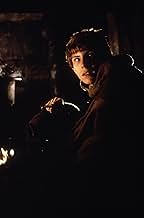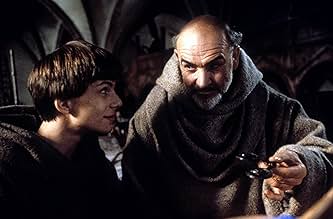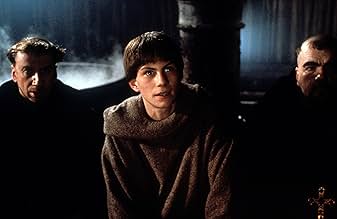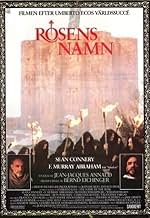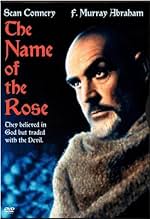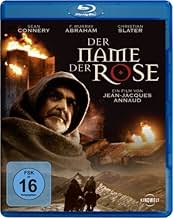Nel 1327 in un'abbazia benedettina dell'Italia del Nord in sette giorni si succedono sette morti violente. Il francescano Guglielmo di Baskerville, giunto all'abbazia col novizio Adso da Mel... Leggi tuttoNel 1327 in un'abbazia benedettina dell'Italia del Nord in sette giorni si succedono sette morti violente. Il francescano Guglielmo di Baskerville, giunto all'abbazia col novizio Adso da Melk, cerca di scoprire il colpevole e il movente.Nel 1327 in un'abbazia benedettina dell'Italia del Nord in sette giorni si succedono sette morti violente. Il francescano Guglielmo di Baskerville, giunto all'abbazia col novizio Adso da Melk, cerca di scoprire il colpevole e il movente.
- Regia
- Sceneggiatura
- Star
- Ha vinto 2 BAFTA Award
- 17 vittorie e 6 candidature totali
- Pietro d'Assisi
- (as Donal O'Brian)
Recensioni in evidenza
Enter Sean Connery playing a Sherlock Holmes (` Elementary my dear Wat-shun ') from the dark/middle ages, replete with a magnifying glass of sorts and a recognisable system of logical deduction. The story is a fine balance of complexity (easy enough to follow, but not too simplistic) with the inclusion of a number of sub-plots to keep it all ticking along nicely. The acting is very good but what makes it stand out is its evocation of another era, which is reproduced with authority. Highly enjoyable.
It's true that the film, directed by Jean-Jacques Annaud, has to skip, or skirt, much of Eco's detail - the famous pages-long description of the doorway, for example, is acknowledged by a few camera shots - but it takes the novel's literary strengths and offers a cinematic equivalent: a vivid depiction of monastic life which thrusts the viewer into the period of the story. In this respect, the production is exemplary: cinematographer Tonino Delli Colli, art director Dante Ferretti and composer James Horner were all operating at the top of their game.
And, as Renton in Trainspotting (1996) knows, Sean Connery proved a perfect choice as William of Baskerville, the 14th-century Sherlock Holmes figure investigating the deaths in an Italian monastery. It's one of Connery's best performances, a happy marriage of character acting and star casting: he suits the physical description of William and he properly conveys the character's wisdom, caution and sense of regret. Christian Slater's Adso, the narrator of the novel, is a surrogate for the viewer, expressing bafflement at the mystery story and awe at William's deductive powers; while F. Murray Abraham works wonders with the underwritten part of the inquisitor Bernardo Gui.
The Name of the Rose is one of the most underrated movies of the eighties. That it wasn't brilliant should not detract from the fact that it's as good as it is.
Lo sapevi?
- QuizSean Connery's career was at such a low point when he read for the role that Columbia Pictures refused to finance the movie when Jean-Jacques Annaud cast him as William von Baskerville.
- BlooperThe secret message on the parchment is exposed three times. The translator heated it to reveal the location of the library, William of Baskerville heated it again when he was in the scriptorium and yet again to show the others the message. When a message is written in lemon juice, heating it will cause it to become exposed because the sugar in the juice is caramelized and thus would not disappear again.
- Citazioni
Adso of Melk: Master? Have you ever been in love?
William of Baskerville: In love? Yeah, many times.
Adso of Melk: You were?
William of Baskerville: Yes, of course. Aristotle, Ovid, Vergil...
Adso of Melk: No, no, no. I meant with a...
William of Baskerville: Oh. Ah. Are you not confusing love with lust?
Adso of Melk: Am I? I don't know. I want only her own good. I want her to be happy. I want to save her from her poverty.
William of Baskerville: Oh, dear.
Adso of Melk: Why "oh dear"?
William of Baskerville: You *are* in love.
Adso of Melk: Is that bad?
William of Baskerville: For a monk, it does present certain problems.
Adso of Melk: But doesn't St. Thomas Aquinas praise love above all other virtues?
William of Baskerville: Yes, the love of God, Adso. The love of God.
Adso of Melk: Oh... And the love of woman?
William of Baskerville: Of woman? Thomas Aquinas knew precious little, but the scriptures are very clear. Proverbs warns us, "Woman takes possession of a man's precious soul", while Ecclesiastes tells us, "More bitter than death is woman".
Adso of Melk: Yes, but what do you think, Master?
William of Baskerville: Well, of course I don't have the benefit of your experience, but I find it difficult to convince myself that God would have introduced such a foul being into creation without endowing her with *some* virtures. Hmm? How peaceful life would be without love, Adso, how safe, how tranquil, and how dull.
- Curiosità sui creditiThe opening credits read - A palimpsest of Umberto Eco's Novel The Name of the Rose
- Versioni alternativeCertain prints of the movie have the sex scene between Adso and The Girl removed in order to comply with local laws.
I più visti
Dettagli
- Data di uscita
- Paesi di origine
- Lingue
- Celebre anche come
- El nombre de la rosa
- Luoghi delle riprese
- Kloster Eberbach, Eltville Am Rhein, Hessen, Germania(interiors: monastery church)
- Aziende produttrici
- Vedi altri crediti dell’azienda su IMDbPro
Botteghino
- Budget
- ITL 30.000.000.000 (previsto)
- Lordo Stati Uniti e Canada
- 7.153.487 USD
- Fine settimana di apertura Stati Uniti e Canada
- 494.571 USD
- 28 set 1986
- Lordo in tutto il mondo
- 7.153.487 USD
- Tempo di esecuzione2 ore 10 minuti
- Colore
- Proporzioni
- 1.85 : 1
Contribuisci a questa pagina


